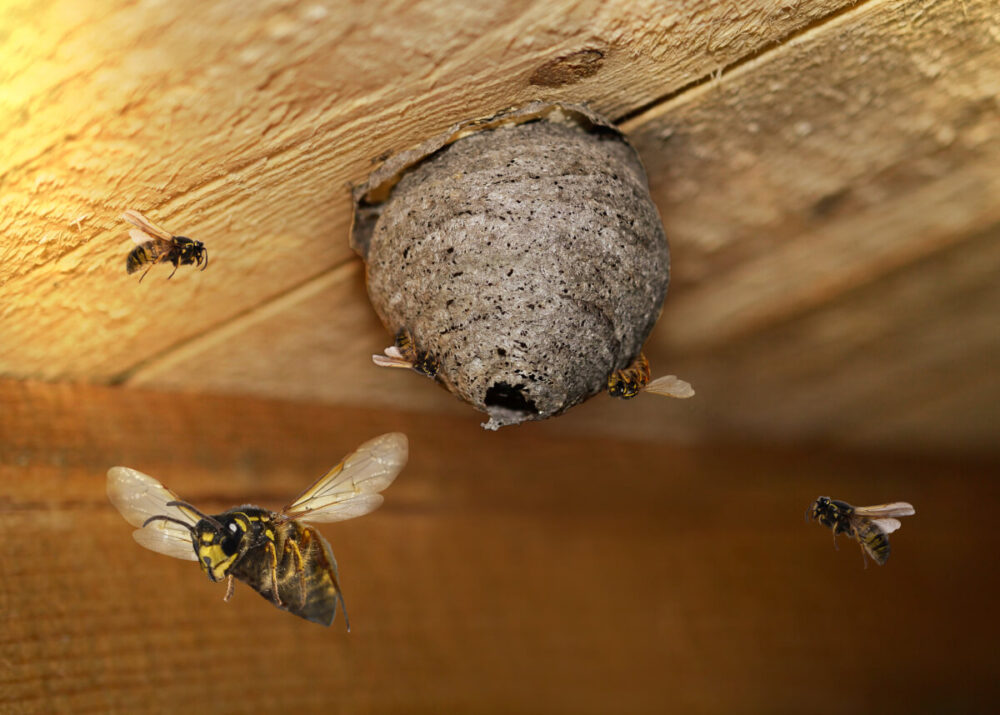


In most cases, a hornet infestation is easy to spot: there's definitely a hornet nest nearby if you see these stinging insects flying around your house or yard, usually near food supplies such as an uncovered compost pile for example. You may see a nest in certain situations, but hornets can also make nests underground or, less frequently, inside your home's walls. You can try to remove the nest yourself if it's easily accessible, but a hornet infestation can be safely and completely eradicated by a pest control professional.
How much does it cost to have a hornet’s nest removed? On average, it costs around $375 with the price range being $100 to $1,300. There are a lot of factors to consider, but the average hornet treatment cost is calculated by considering aspects like the species of hornet encountered, type of infestation, future infestation, chemical pesticides to be used, and much more. It would be best to call a pest technician or pest control specialist to get a more accurate price and quotation..
Professional hornet eradication costs typically range from $100 to $1,300, with a national average of $375. The good news is that hornet treatment is usually a one-time pest control procedure, though you may want to plan additional visits to ensure that the hornets don't return.
The expense of removing a hornet nest is frequently included in the total cost of the procedure, typically factoring in inspections and prevention costs. Hornet management is sometimes included in a bigger pest control plan for your home or business. An initial visit in this situation is generally between $150 and $300. Depending on how intensive the treatment is, monthly or semi-weekly appointments might have an average cost of $40 to $70.
A hornet exterminator will need to check your property in order to provide you with a more accurate quotation. Price will be determined by a number of factors:
Wasp and hornets come in a variety of sizes, shapes, and colors, with some being more aggressive and hazardous than others. Here are some of the most prevalent hornet species, as well as how much it costs to get rid of them:
The location of a hornet nest is frequently determined by the kind of hornet. The easier the exterminator has access to the nest, the less time and money it will take to eliminate it. A hornet nest hanging from a second-story balcony or within a chimney will cost less to remove than one on a low tree branch.
It's impossible to offer specific costs based on location, but here's a rough guide to hornet nest sites, from least to most expensive:
To put it another way, the larger the nest, the more hornets there are. The bigger the nest, the more difficult it is to thoroughly remove it, raising the expense of hornet removal.
Hornets are commonly treated using an aerosol spray or concentrated liquid administered directly to the nest, which kills hornets on contact and continues to kill any hornets that return to the nest for several days. Some methods need the use of specialist equipment, such as a vacuum to extract hornets from small cracks, which will cost more.
Hornet are also killed using pyrethroid insecticides in most first-line treatments. Insecticides that are less harmful and better for the environment will cost more. Sprays and dust are the 2 sorts of chemicals used to get rid of hornets. These may be bought online or at any home improvement retailer like Home Depot, Lowes, or Menards.
If you want to kill and discourage hornets without using chemicals, there are a variety of methods available for purchase online or in most kitchens.
$10 to $20 for dummy nests: This keeps them from coming into the area or constructing a nest. Hornets and bees will not construct nests close to existing colonies.
Depending on the magnitude of the infestation, the cost of hornet nest removal may increase or reduce. A larger nest implies more hornets, which means a greater cost.
When a can of hornet killer costs $3 to $5 at the hardware store, you might ask if paying for expert eradication is worth it. In certain circumstances, you may be able to save money by doing it yourself rather than hiring an exterminator. A tiny infestation with a nest that is above ground and visible would be the best-case scenario for DIY.
A can or two of hornet killer may be all you need if you discover the problem early enough and the nest is easily accessible. Other than that, you should always consult with a professional, for all you know you might have an allergic reaction to hornets.
Simple DIY approaches are unlikely to repel larger hornet infestations with concealed nests. Furthermore, if you attempt to get rid of hornets on your own, you may be exposed to hornet stings when administering the treatment, and you may need to acquire protective gear, such as gloves and goggles, if you don't have them already.
Hiring a pest control professional increases your chances of eradicating the problem completely the first time. It'll most likely cost more than doing it yourself, but you'll be considerably safer.
Companies that provide pest control services provide their specialists with the necessary training, pesticides, and equipment to do the task safely and quickly. Professional exterminators are your best choice in situations of more serious or concealed infestations.

PermaKill Exterminating’s team of invasive species exterminators carefully examines the extent of damage and infestation before recommending the best treatment plan and professional service for your property.
PermaKill Exterminating has the right tools, methods, and techniques to prevent and stop all kinds of pests and insects from invading and taking over your space. We have a slew of other services to free your home from pests. Contact PermaKill Exterminating today to receive a free quote on the cost of hornet treatments from our extermination experts.
Call us now at (973) 584 – 6414.